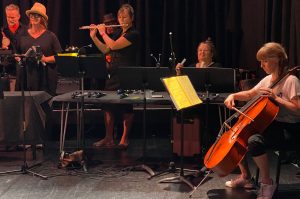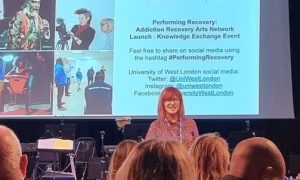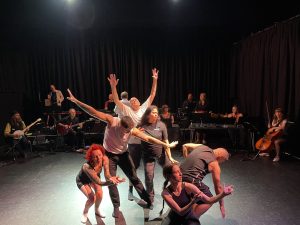September is recovery awareness month, an internationally recognised time for awareness, reflection, and of course, celebration of recovery from drug and alcohol addiction. In September 2022, the New Note Orchestra joined other arts recovery organisations from around the country at the University of West London for the Addiction Recovery Art Network conference to meet, showcase skills, and discuss ideas.
Social stigmas
During September 2022, U.K. groups centred on recovery take part in awareness events and fundraising. The aim is to strengthen the community of those in recovery, communicate a message of hope to those suffering in active addiction, and cast off the stigma of addiction and recovery in front of the general public.
Although the idea of addiction and recovery is more openly discussed in the media now, compared with around 50 years ago, there is still a considerable stigma. Dependency on alcohol and drunkenness in “inappropriate” circumstances are still looked down on, and drug use is still considered in the U.K. to be primarily a law and order issue — despite relaxing attitudes towards some recreational use. Though alcohol use is widespread across the country and even considered a social norm by many, the term “alcoholic” carries many negative connotations.
Even with many high-profile people admitting the use of drugs from marijuana to cocaine, including actors, musicians, and politicians still in office, to be an “addict” still suggests criminality, separation from society, and intense danger.
The recovery paradox

New Note practices for the next day
Given the stigma, it remains a great irony that for many people in recovery —from those in the early days to those who have not used addictive substances for decades — self-identification as an alcoholic or addict is an essential part of recovery and sobriety.
In fact, many recovery programmes suggest that identifying oneself as an addict or alcoholic is an essential first step on the road to recovery.
This creates an unfortunate paradox. Being part of a recovery programme can help so many people to reintegrate into society, while at the same, being a member of that group can classify that person as undesirable.
And this stigma can create resistance in people who might benefit from a recovery programme but fear the reaction from their community if their addiction issues become known.
Even people who are compassionate rather than explicitly judgmental can have harmful or ignorant attitudes, or simply discriminate. They might wonder, “Is the addict mentally challenged?” “Can they be trusted with money?” “If I hire them, will my business suffer?” “I know they haven’t drunk for a long time, but how do I know they won’t start again tomorrow?” “How can I befriend them if I like to drink?” “How can someone in recovery be fun?”
Other stigmas can come from people in active addiction. From the outside, recovery can seem arduous, overly emotional, and dull. People in recovery programmes can come across as preachy or joyless. And going without stimulants can be scary if you think it will kill your creativity, for example.
But challenging all of this stigma has become a mission of The New Note Orchestra and other arts recovery organisations around the U.K.
When people in recovery emerge in a new light — creating quality art, giving back to the community, and building support networks — the public can recognize them as productive, creative, and even as positive role models. Those undergoing personal struggles can also see that sobriety does not have to be a battle in darkness and isolation.
Recovery Arts can communicate the nuance of lived experience and therefore advocate for a better understanding of addiction
A meeting of minds
On September 8th, arts recovery organisations from around the country attended the Addiction Recovery Art Network conference at the University of West London (UWL).
Organised by Dr. Cathy Sloan, course leader for BA Applied Theatre and BA Actor Musicianship at the university, the conference intended to bring together active organisations, the Arts Council England, and other key stakeholders in recovery and arts in the country to share knowledge.

Dr Cathy Sloan opens the conference
Dr. Sloan explained: “Both challenging societal stigma and supporting people in recovery to navigate beyond a stigma-bound identity are important aspects of recovery arts.”
“Recovery Arts can be a very effective conduit for expressing and developing recovery identities. They enable the sharing of lived experience either directly, through autobiographical work, or indirectly, through exploring themes relating to addiction, wellbeing and recovery. The creative and aesthetic elements of these activities enable people affected by addiction to build social confidence and to demonstrate their potential as artists, which disrupts unhelpful stereotypes.”
“Recovery Arts can communicate the nuance of lived experience and therefore advocate for a better understanding of addiction and mental wellbeing struggles, which in turn can contribute to change in how society responds to these issues.”
“Most importantly, many of the arts activities I have witnessed reveal the strength, hope, and experience of people who have survived addiction and/or mental health issues and enable participants (performers/artists) to move beyond stigma and isolation through cultural citizenship.”
the emerging field of recovery arts organisations will thrive through connection and collaboration with each other
Partners in dance
To open the conference, the New Note Orchestra and Fallen Angels Dance Theatre performed a collaboration. Fallen Angels is a troop based in Chester that supports people in recovery. Like the orchestra, they work with professionals to create work that they perform throughout the country, especially in the Northwest of England.
This is the first time the New Note Orchestra has worked directly with another organisation like this, and in some ways, it was an experiment that can be used to model future collaborations.
Dr. Sloan observed: “In my view, recovery thrives with connection with supportive others. Likewise, I believe that the emerging field of recovery arts organisations will thrive through connection and collaboration with each other. Combining resources and sharing initiatives, such as the wonderful offerings we had at the Performing Recovery event, support all of us involved in the network to widen our reach and also learn from each other.
Combining different performance forms, such as dance and live music in the case of the collaboration with New Note and Fallen Angels, creates a work of art that is innovative, powerful, and impactful. This will, in turn, help to raise awareness of recovery arts, as well as showcase the artistic excellence that exists within this arts-based recovery community.”

New Note and Fallen Angels run through their collaboration
The collaboration took the form of two pieces. The first was Astral’s Journey Part Two, which can be found on the orchestra’s 2021 album Kind Rebellion, and the second was the Woods, last performed in a music video from 2020.
“When we worked with the dancers, I was intrigued with how it all came together,” said Warner, a member of the New Note Orchestra. “It was difficult to concentrate at first! But it was great working with other people. In the past few years, we’ve recorded videos and done live streams. But it’s different when other people are there. We played in front of more than 100 people at the Old Market a couple of months back and being in front of an audience means you have to act more professionally. The collaboration was great — I hope we’ll be working with them again.”
Warner has been with the New Note Orchestra for around four years, joining a couple of months after he entered sobriety. “The orchestra has been important in my recovery. In some ways, it’s been my lifeline. I didn’t have a bass guitar when I started at the orchestra, so I was on percussion at the beginning. But then I moved on to bass, and now I’m playing keyboards.
The orchestra is like a community, and it’s safe because we have so much in common. We all get on and support each other, and it’s helped me get through a lot. I wish it was more than once a week.”
Other groups represented at the conference were:
- Messy Connections, a performance and research network
- Small Performance Adventures, which creates supportive workshops, performances, and events
- Geese Theatre Company, which uses theatre to enable people in criminal justice and social welfare settings to make positive changes
- Portraits of Recovery, a Manchester-based visual arts charity supporting people and communities affected by addiction and recovery
- Outside Edge Theatre Company, which focuses on improving the lives of people affected by any form of addiction, including families, carers, and champions
- The Outsiders Project, which helps individuals in recovery
- Horizon, a creative media hub based in Brighton, supporting those in addiction recovery.
The conference closed with a session where various attendees discussed issues and ideas that could impact the future of the addiction recovery arts sector. Speaking about the future, Dr Sloan said:
“It is clear to me that there is a need for a formalised network, perhaps beginning with an online hub through which people interested in either joining or commissioning recovery arts activity can access the necessary information to connect them to their nearest group. It is my hope that the network can also support the growth of this area of arts practice through offering training and events that enable others to experience and learn about the ethos and approaches of this type of artistry and, even, for artists in recovery to access mentorship opportunities. There is also a potential for this to become a global recovery arts network.”
Fallen Angels and the New Note Orchestra will be performing together at the Royal Opera House Lyceum Theatre on 4th November 2023 details can be found HERE
—
The New Note Orchestra has been welcoming Autumn in with a new playlist

